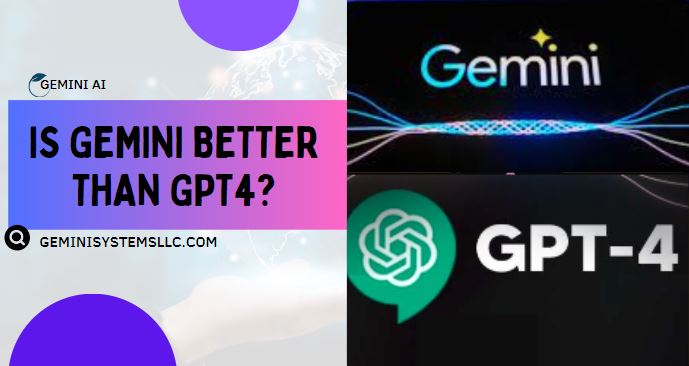The debate over whether is Gemini better than GPT4? is not a straightforward one. While Google Gemini excels in processing extensive datasets and understanding complex, multimodal information, GPT-4 shines in code generation, image understanding, and tasks requiring high precision in language comprehension. Ultimately, the choice between Gemini and GPT-4 hinges on the specific requirements and objectives of the task at hand.
As an experienced AI consultant and analyst, I’ll provide insights into the functionalities, strengths, and potential applications of both models. By the end, you’ll have a clearer understanding of whether Gemini AI surpasses GPT-4 and how each can benefit various use cases.
Both Gemini and GPT-4 represent significant advancements in AI technology, each with its unique strengths and applications. Understanding the nuances of these models is crucial for leveraging their capabilities effectively and choosing the right tool for the task at hand. For Further debate, you can also visit the Reddit post.
Is Gemini better than GPT4?
With both Gemini and GPT-4 vying for supremacy in the AI arena, it’s crucial to conduct a thorough comparison to discern their strengths, weaknesses, and real-world applicability. Gemini is better than GPT-4, as the comparison depends on specific use cases and requirements.
Following is the compression of Google Gemini and Chat GPT4.
| Feature | Gemini | GPT-4 |
|---|---|---|
| Processing Extensive Datasets | ✔️ Excels in processing large volumes of data | ❌ Not specifically optimized for extensive datasets |
| Multimodal Understanding | ✔️ Capable of understanding text, images, and more simultaneously | ❌ Primarily focused on text-based tasks |
| Code Generation | ❌ Limited capabilities in generating code | ✔️ Demonstrates proficiency in code generation |
| Language Comprehension | ✔️ Understands complex language structures | ✔️ Excels in natural language processing tasks |
| Image Understanding | ✔️ Capable of processing and interpreting images | ✔️ Demonstrates strong capabilities in image understanding |
What is Gemini and GPT-4?

Google’s Gemini AI, formerly known as Google Bard, represents a significant leap in AI capabilities. Gemini 1.5 Pro is designed to excel in processing extensive datasets and understanding complex, multimodal information. This makes it particularly suitable for tasks requiring deep contextual insights across large volumes of data.
On the other hand, GPT-4 Turbo, developed by OpenAI, shines in code generation, image understanding, and tasks demanding high precision in language and visual comprehension.
Gemini 1.5 Pro
At the forefront of Gemini’s lineup is Gemini 1.5 Pro, a powerhouse designed for processing extensive datasets and deciphering complex, multimodal information.
Equipped with advanced neural networks and sophisticated algorithms, Gemini 1.5 Pro excels in extracting deep, contextual insights from vast volumes of data, making it indispensable for applications requiring nuanced understanding and analysis.
Gemini Advance
Gemini 1.5 Pro is Gemini Advance, a versatile AI model tailored to tackle the most pressing challenges of the future.
With its adaptive learning capabilities and adaptive architecture, Gemini Advance empowers organizations to navigate dynamic environments and stay ahead of the curve in an increasingly complex world.
GPT-4 Turbo
Leading the charge for GPT-4 is GPT-4 Turbo, a powerhouse renowned for its unrivaled precision and performance in language and visual comprehension. Armed with state-of-the-art neural architecture and refined training algorithms, GPT-4 Turbo sets a new standard for AI excellence, delivering unparalleled results across a myriad of tasks and domains.
How to Access Gemini and GPT-4 for Free?
Accessing these advanced AI models for free can be challenging due to their proprietary nature. However, Google offers access to Gemini through its AI platform, providing developers and researchers with tools to leverage its capabilities.
Similarly, OpenAI provides access to GPT-4 through its API, albeit with certain usage restrictions and associated costs.
How Does Gemini Work?
Gemini operates by utilizing advanced machine learning algorithms, including deep neural networks, to analyze and interpret complex data patterns. Its ability to process multimodal information allows it to understand text, images, and other forms of data simultaneously, enabling more nuanced insights and decision-making.
How Does GPT-4 Work?
GPT-4 employs a similar underlying architecture, leveraging transformer-based models to generate human-like text and comprehend diverse inputs. It excels in natural language processing tasks and has demonstrated remarkable capabilities in understanding and generating text across various domains.
FAQs
What distinguishes Gemini from GPT-4?
Gemini’s strength lies in its ability to process extensive datasets and understand multimodal information, whereas GPT-4 excels in tasks such as code generation and natural language processing.
How can I access Gemini and GPT-4 for free?
Access to Gemini can be obtained through Google’s AI platform, while GPT-4 is accessible via OpenAI’s API, albeit with certain usage restrictions and costs.
What are the key features of Gemini?
Gemini boasts features such as processing extensive datasets, understanding multimodal information, and offering deep contextual insights.
In what areas does GPT-4 outperform Gemini?
GPT-4 shines in tasks requiring code generation, language comprehension, and natural language processing across various domains.
Can Gemini generate code?
While Gemini is not specifically optimized for code generation, it demonstrates proficiency in understanding complex language structures.
How does Gemini compare with GPT-4 in image understanding?
Both Gemini and GPT-4 exhibit strong capabilities in image understanding, although GPT-4 has shown exceptional performance in this area.
Which AI model is better suited for my project: Gemini or GPT-4?
The choice between Gemini and GPT-4 depends on the specific requirements of your project. Gemini is ideal for tasks involving extensive datasets and multimodal information, while GPT-4 excels in code generation and natural language processing.